This month is the one hundredth anniversary of the Armenian genocide.
That’s right — it’s a genocide. That’s exactly what Pope Francis said recently — much to the chagrin of the Turkish regime, which recalled its ambassador to the Vatican. Worse: Turkish Prime Minister Ahmet Davutoglu said that calling the wholesale slaughter of Armenians “genocide” is tantamount to “Islamophobia” — which wins this week’s prize for “The Most Irresponsible Playing Of The Islamophobia Charge.”
Why should Jews be talking about this? Because when we look at the Armenians, it is as if we are looking in the mirror.
The poet Joel Rosenberg writes:
I cite our landless outposts of diaspora…
I cite our neighboring quarters in the walled Jerusalem,
our holy men in black,
our past in Scripture,
and our overlapping sacred sites.
I cite our reverence for family ties,
our Middle Eastern food, our enterprise,
our immigration histories, our ironic manner, our eccentric uncles.
Our clustering in cities, our cherishing of books, our vexed and aching homelands.”
Here’s how it happened. In the waning days of the Ottoman Empire, the Armenians were seen as a foreign element in Turkish society – and, in this sense, they occupied the same place as the Jews of the Ottoman Empire. Like the Jews, the Armenian Christians challenged the traditional hierarchy of Ottoman society. Like the Jews, they became better educated, wealthier, and more urban. Like “the Jewish problem” that would be frequently discussed in Germany, in Turkey they talked about “the Armenian question.”
The Turkish army killed a million and a half Armenians. Sometimes, Turkish soldiers would forcibly convert Armenian children and young women to Islam. The Turks delved into the records of the Spanish Inquisition and revived its torture methods. So many Armenian bodies were dumped into the Euphrates that the mighty river changed its course for a hundred yards.
in America, the newspaper headlines screamed of systematic race extermination. Parents cajoled their children to be frugal with their food, “for there are starving children in Armenia.” In 1915 alone, the New York Times published 145 articles about the Armenian genocide. Americans raised $100 million in aid for the Armenians. Activists, politicians, religious leaders, diplomats, intellectuals and ordinary citizens called for intervention, but nothing happened.
The Armenians call their genocide Meds Yeghern (“the Great Catastrophe”). It was to become the model of all genocides and ethnic cleansing. It served the Nazis well as a model. Not only the act of genocide itself — but also, the passive amnesia about that genocide. “Who talks about the Armenians anymore?” laughed Hitler.
One day in 1915, in the small town of Kourd Belen, the Turks ordered eight hundred Armenian families to abandon their homes. The priest was Khoren Hampartsoomian, age 85. As he led his people from the village, neighboring Turks taunted the priest: “Good luck, old man. Whom are you going to bury today?”
The old priest replied: “God. God is dead and we are rushing to his funeral.”
Just as Elie Wiesel, writing in Night, recalled a child hanging from a gallows in a concentration camp, his small body too light to die immediately. “Where is God?” cries a prisoner. “Hanging on the gallows.”
After the Shoah, Jews cried aloud to God: “O God, how could You do this to us, the children of Your covenant?” After the genocide, Armenian theologians cried: “O God, how could this have happened to us – for we were the first people to adopt Christianity as a state religion?” Some Armenian Christians referred to the story of Sodom and Gomorrah and asked: “Were there not even fifty Armenians who could have been saved?”
After the Shoah, Jews cried: “We must have sinned. God has used the Nazis as a club against us.” Armenians cried: “God used the Turks as a club against us. We were a Christian nation, but we lived as atheists.” Some Armenian Christians said: “If this is what God can do to us, then God and Jesus Christ — you go your way, and I will go mine. Don’t bother me anymore.”
Is it chutzpah to raise this, as Jews mark Yom Ha Shoah, and the seventieth anniversary of the liberation of the camps? Some Jews have wanted to hoard the concept of genocide — “What happened to the Armenians wasn’t as bad as the Holocaust!'” True, but that’s an extremely high and ghastly bar to set. True — no genocide has approached the scale of the Shoah. True — not every genocide is created equal.
Moreover, the very nature of the Armenian catastrophe was different. Jews were killed wherever they lived in Europe; by contrast, Armenians outside of Armenia were relatively safe. Anti-semitism is a deep, pervasive moral illness; by contrast, there is no such thing as “anti-Armenianism” in the collective psyche of the world.
But, If Jews do not allow the world to compare the Holocaust to other genocides, then its relevance to the world will wither.
And when that happens, Jews would be inflicted by moral laryngitis, losing their ability to speak truth to the world.







